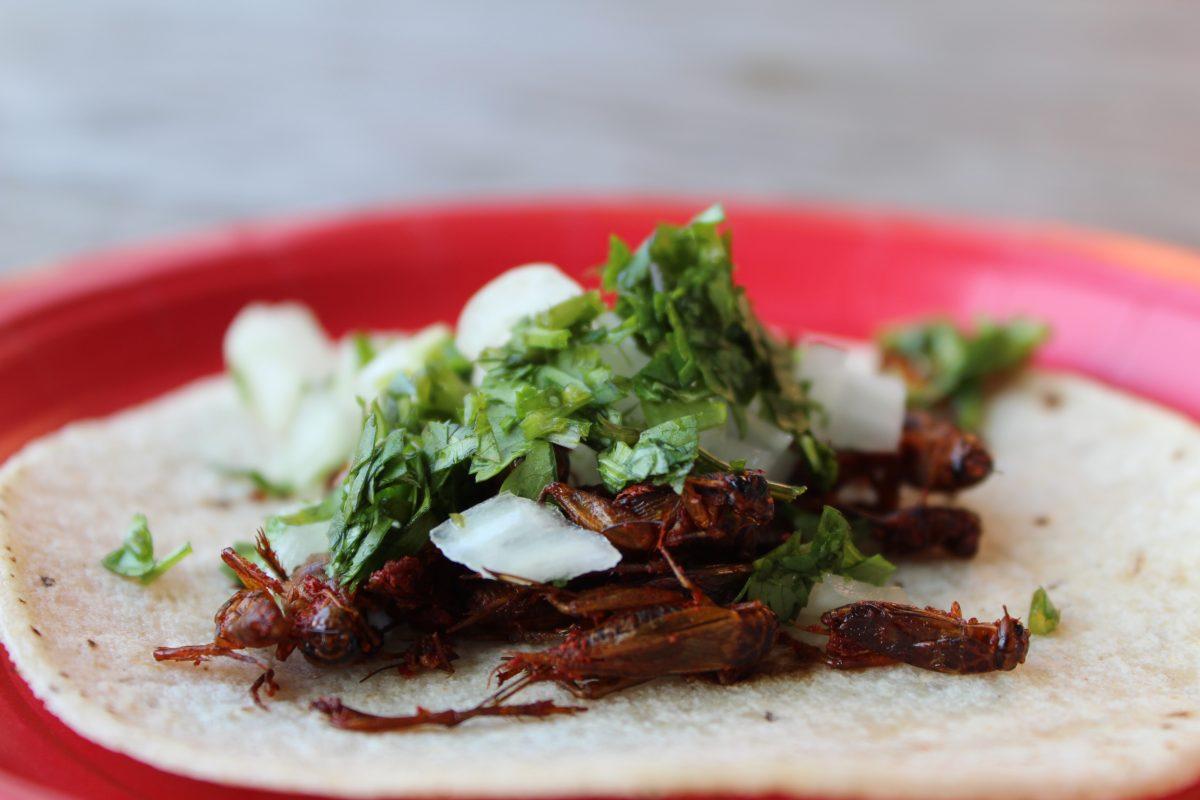Protein alternatives, especially in reaction to large-scale meat farming, have been at the forefront of conversations surrounding food sustainability in recent years; these talks have only been amplified by rising food prices and the rising popularity of alternative diets. In Wicked Problems, Wolfpack Solutions’ newest installment of their The Future of Food series, the forum invited an expert in insect nutrition and a chef to educate students about the viability of using insect-based protein in their Edible Insects event.
Gabriel “Keith” Harris, a professor in food, bioprocessing and nutrition sciences and the director of undergraduate programs for food science, explained that his first time purposefully consuming insects was on his honeymoon in Southern Mexico. Harris said farmers use nets across fields of grain in order to collect the grasshoppers, providing a food source and protecting the grain from the grasshoppers.
“If you go to the market there, you will see piles of roasted grasshoppers and some [piles] of them are a meter tall, just enormous,” Harris said.
Harris said that while most Americans find eating insects to be unusual, a large portion of the world has been using insects for thousands of years.
“It’s popular around the world and I would say its popularity is really increasing,” Harris said. “Traditionally, there have been cultures — I’ve mentioned Mexico — and there are certainly many other cultures, at least 20 cultures around the world where this is normal.”
Harris said that while eating insects may seem strange to most Americans, everyone does it regardless.
“Of course, we’ll still have to overcome the issue of just ‘I don’t want to eat insects,’” Harris said. “But spoiler alert: everybody eats insects. There’s no question, everybody eats insects because it’s in all of the foods that we consume. We’re eating insects regardless, so we might as well eat some more.”
Harris said that the Western world’s uneasiness toward eating insects most likely stems from a long-standing tradition of large animal agriculture, but also pointed out the hypocrisy of arthropods like crabs and shrimp being acceptable foods, while insects are generally not.
“It is interesting to me that there is a widespread acceptance of things like crabs, which to me, when I look at crabs and shrimp, I don’t see a huge difference between eating crabs and shrimp and eating insects,” Harris said. “I realize biologically, they’re not really that similar, but they have sort of that creepy crawly kind of an aspect to them and so the idea that eating that type of seafood is widely accepted and it just is odd to me that insects are not.”
While Harris acknowledges the “ick factor” that is associated with eating whole insects, he said he believes the consumption of insects in America will first be popularized through insect-based powders.
“We try this over and over again with different activities and when students or the general public sees legs and antennae, they kinda get freaked out and when we make cookies or something where you can’t see any of that and there’s no texture change and flavor change, they’re just in there,” Harris said. “Nobody cares. It’s very interesting that it seems like the issue is the look and maybe the texture, it’s not the fact that it’s there.”
Harris said that he has seen a stark difference in the acceptance of eating insects since he began teaching at NC State in 2007.
“In ‘07, it was like a dare,” Harris said. “You would take a picture of the person eating it and it was a huge deal. Now, it’s not a big deal. Most everybody will try it, some won’t, but most everybody will try it. I think it is changing already.”
Harris said while the consumption of insects can certainly contribute to sustainability, they are not the only solution.
“I don’t think insects are the solution just as [much as] I don’t think plants or yeast or other options we have are the solution,” Harris said. “I think we have to apply multiple solutions to really address issues to sustainability
At the event, Emilize Momplaisir, a graduate student in food, bioprocessing and nutrition sciences cooked chapulines, which are grasshoppers seasoned with a spice called achiote, looking to mimic the grasshoppers Dr. Harris enjoyed in Southern Mexico but using crickets instead.
“We marinated them in achiote,” Momplaisir said. “We thinned it with a little bit of vinegar as well as some oil to really coat the insects, it’s not that bad, okay?”
Outside, where the crickets were being reheated and prepared to put into tacos, a line of about thirty students waited for their chance to try the meal.
Connor Lamphier, a first-year in engineering was first in line to try the chapulines.
“I really enjoy trying new foods so I was actually very excited to eat crickets,” Lamphier said. “I’d definitely do it again. I’m excited about the prospects because the efficiency of production and how nutritional they are. I think it also poses an easy answer to the ethics of large-scale farming because it’s coming out that pigs are really, really intelligent. A pig is [as] smart as a three-year-old and it makes you think about the ethics of keeping animals like that and raising them to be killed. I think that question gets easier when it’s a small insect.”
Sarah Simmons, a third-year in environmental science, like most, was hesitant about the prospect of eating insects before this forum.
“Before this event, I never really understood why people would eat insects, I guessed it was just a part of the culture and I wasn’t really aware of the main reason,” Simmons said. “This event has really opened my eyes and changed my perspective on eating bugs. They can be really delicious if you add a little spice and something that you enjoy eating … honestly, if you just put yourself out there and get out of your comfort zone, great things can happen.”














